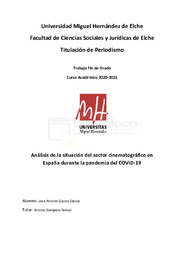Resumen :
El 15 de mayo de 2020 empezó el estado de alarma en España decretando un confinamiento obligatorio que duraría varios meses. Durante esta época todos los sectores lo pasaron mal entre ellos el sector cinematográfico que más de un año después sigue estando muy lejos de las cifras que hacía antes de la pandemia. Las salas se vaciaron, cuando volvieron había que respetar unas medidas de seguridad que impedían que las películas fueran rentables, además de la falta de estrenos y el miedo de la gente a poder contagiarse del virus.
En pleno agosto de 2021, más de un año después del inicio de la pandemia, con la vacunación muy avanzada, con el cine demostrando ser un lugar seguro (en todo este tiempo no ha habido ningún foco de contagio en una sala de cine) y con los estrenos de Hollywood de vuelta el público la situación sigue estando muy lejos de la etapa antes de la covid-19. Hasta el cine que lidera la taquilla española pierde dinero, las productoras han visto cómo sus rodajes se han encarecido durante esta época y las distribuidoras se buscan la vida para poder obtener beneficios con las películas.
Sin embargo el sector se mantiene positivo, saben que saldremos de esta y todos se buscan la vida para sobrevivir, los cines han reconvertido sus salas para actos culturales, fiestas o torneos de videojuegos, las productoras tuvieron que innovar y crear contenido sin poder estar en contacto y ahora extreman las precauciones para poder seguir trabajando y las distribuidoras han cambiado el modelo de exhibición negociando con plataformas de streaming y reduciendo la ventana de exhibición
On May 15, 2020, the state of alarm began in Spain, decreeing a mandatory confinement that would last for several months. During this time, all sectors had a hard time including the cinematographic sector, which more than a year later is still very far from the figures it made before the pandemic. The movie theaters were empty, when the people come back they had to respect security measures, in addition to the lack of premieres and people's fear of being able to catch the virus that prevented the films from being profitable.
In the middle of August 2021, more than a year after the start of the pandemic, with advanced vaccination, with the cinema proving to be a safe place (in all this time there has been no source of contagion in a movie theater) and with the Hollywood premieres back, the box office is still very far from the profits before covid-19. Even the cinema that leads the Spanish box office loses money, the production companies have seen how their shootings have become more expensive during this time and the distributors have troubles to be able to obtain benefits from the films.
However, the sector remains positive, they know that we will get out of this and everyone is looking imaginative solutions to survive, the cinemas use their rooms for cultural events, parties or video game tournaments, the production companies had to innovate and create content without be in contact and now they take extreme precautions to be able to continue working and the distributors have changed the exhibition model by negotiating with streaming platforms and reducing the exhibition window
|
 La licencia se describe como: Atribución-NonComercial-NoDerivada 4.0 Internacional.
La licencia se describe como: Atribución-NonComercial-NoDerivada 4.0 Internacional.
.png)
